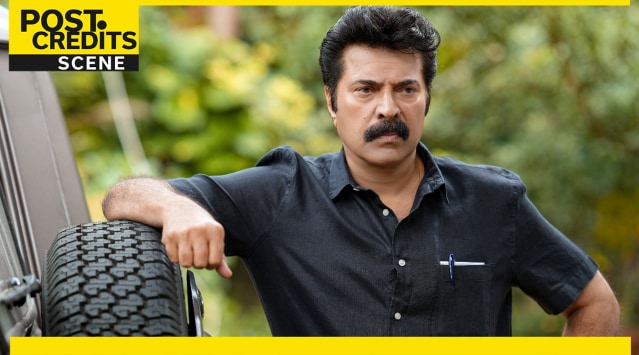Of the many references that director Jeo Baby makes to his own past work in his new film, Kaathal – The Core — shots of men sitting around a dining table are stark reminders of The Great Indian Kitchen, as are the central themes of identity and emancipation — the one that felt entirely unexpected was a moment in which a group of dancers performs the salsa. It took a moment to remember that these were the same visuals with which Baby chose to end his breakout movie. Released in the middle of the pandemic, The Great Indian Kitchen is a great example of how arbitrary success in the film business can often be.
The movie was famously rejected by all the big streaming platforms, before it was scooped up by the Malayalam-language service Neestream. When it became a word-of-mouth sensation, it ignited a bidding war among the big players, and ultimately gained wider exposure on Prime Video. The Great Indian Kitchen remains one of the best Indian movies of 2021, and two years later, Baby has somehow been able to meet the high standards that he set for himself with that film. But while admittedly marking a stylistic departure for the director, Kaathal also falls back on the same narrative crutch that stopped The Great Indian Kitchen from being one for the ages.

Also read – Pokhar Ke Dunu Paar movie review: Poetic and profound, the best Hindi film of the year
These are the minor differences that separate a good film and a great one, or, to use a more reductive analogy, the difference between four-and-a-half stars and a full five. That these pivotal scenes arrive at the very end of both movies is about as heartbreaking as anything in them. Because both The Great Indian Kitchen and Kaathal are uncommonly sensitive films; impeccably crafted, empathetic, and unafraid of embracing sadness, an emotion that seems to scare most people away. These films are so finely tuned that you spend most of their respective final acts chanting a silent prayer for a smooth landing. Please don’t mess up, please don’t mess up, please don’t mess up…
But alas. When our protagonists Mathew and Omana get Pollyanna resolutions at the end of Kaathal, after they’ve been to hell and back, it can’t help but feel a little tacked on. A naturally gifted director — he knows exactly where to put the camera — Baby shows uncommon restraint in his examination of a complex marriage. Played by Mammooty, Mathew is a middle-aged gay man who has lived his entire life in the closet, confused by the truth and terrified that it will come out one day. The veteran superstar, whose appearance elicited a round of applause at my screening, has now delivered two of the finest (male) performances of the year so far, the other being in director Lijo Jose Pellissery’s Nanpakal Nerathu Mayakkam. This is physical acting at its finest. Mathew walks glacially, stands timidly, and always seems to be looking over his shoulder, as if he is afraid of being caught for having committed a crime. He feels a deep sense of shame, but he doesn’t know why.
His wife, Omana, has suffered in silence as she watched her life pass her by. She barely speaks even now, even though it’s obvious that she’s on the verge of erupting at any moment. Played by Jyothika, her decision to file for divorce — this is the film’s inciting incident — isn’t one that was taken overnight. We’re told that she’d asked him for a separation several times in the past, but backed out in an act of self-sacrifice to protect Mathew. Being gay in India was a crime until a few years ago. The ensuing court case pushes Mathew to finally make peace with his identity, forgive his father, and to seek forgiveness from Omana, who was unwittingly made the collateral damage in this unspeakably heartbreaking tragedy. Nobody is the villain, and the movie is very careful about not leaning too hard on either side.
Kaathal concludes with Mathew apologising to Omana for the pain that he has put her through, which in itself feels like a major moment in Indian cinema. Forget all the actual progressive messaging in the movie; as a society, we’re still in a place where the sight of a man expressing remorse for his actions (to a woman!) can seem like a radical statement. Mammootty and Jyothika are terrific in this scene, as the emotions that they’ve bottled up for decades come to the surface. But instead of cutting to black and leaving the audience with a bittersweet lump in the throat, Baby gives into the temptation of adding an epilogue.
Story continues below this ad
A few months have passed by, it seems, and Omana and Mathew are sitting in a cafe. A man walks into frame and takes a seat across from them, at which point Mathew gets up and leaves. The man is a possible suitor, and it is implied that Omana is finally ready to take baby steps towards a new life. But then, a curious thing happens. After having balanced both perspectives so delicately for two hours, the movie appears to leave Omana behind, as it follows Mathew out of the cafe, where he stands in solitude for a moment or two, before the camera pans to reveal his old lover, Thankan, waiting in the car for him. They drive off into the sunset, as a rainbow forms in the sky. It’s a climax befitting a movie by the man who chose to end his searingly tense thriller about societal segregation with a celebratory dance sequence. Practically 30 seconds from the finish line, in a hurry to test our capacity for unabashed idealism, Kaathal stumbles.
But we know that there will be no end to Omana’s pain. We know that her life will not magically sort itself out simply because she has released herself from the shackles of the past. She lost her youth to this man, the prime of her life. Her suffering isn’t the same as his; in many ways, it’s more wrenching, because she was pulled into this mess against her will. Coming back from this isn’t going to be easy. All she wants in the film is freedom. Omana doesn’t want a new partner, nor does she want to marry into a new family. And yet, this is the ‘happy’ ending that the movie deems fit for her. Would it have been too murky to give her the freedom that she has been craving, but also make it clear that her life as a newly independent woman won’t be smooth sailing? Would it have been too much to leave the audience wondering if she will thrive, or if she will succumb, like Brookes from The Shawshank Redemption — the old man who’d become so accustomed to life in prison that he couldn’t bear living on the outside.
Also read – While We Watched: Tragic Ravish Kumar documentary is the best war movie of the year
Catharsis, you see, is temporary. It’s the path of least resistance; the easy way out. We want these characters to be happy, and that’s what the movie gives us, even if it means asking for leaps of faith. But for this climax to linger, to haunt, it needed to avoid pandering, it needed to be more complex — emotionally, not narratively. But because it wraps things up so neatly, Kaathal leaves no room for the ‘what now?’ question that the best films often end with. This isn’t like The Graduate, where you’re left to stew in the uncertainty of whether Dustin Hoffman and Katharine Ross will be able to make their marriage work at all; nor is this like La La Land, where you know that Seb will forever live with a broken heart. We won’t wake up in a cold sweat at midnight seven months from now, concerned about how Mathew and Omana are doing, because the movie has already told us they’re going to be okay.
Story continues below this ad
Post Credits Scene is a column in which we dissect new releases every week, with particular focus on context, craft, and characters. Because there’s always something to fixate about once the dust has settled.




































